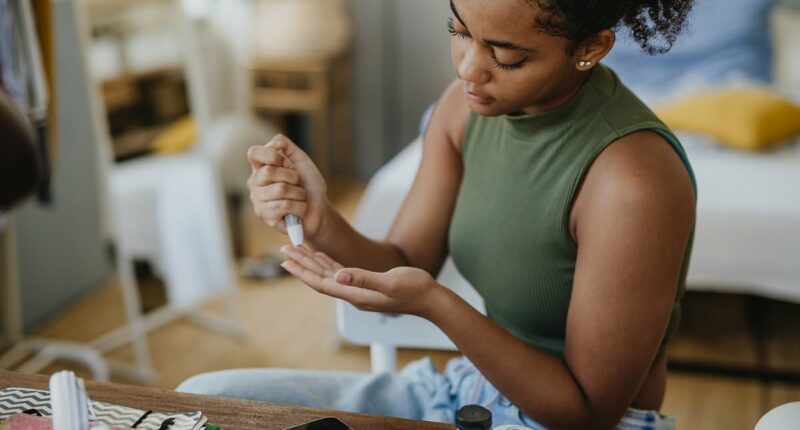Share this @internewscast.com
A possible third type of diabetes that could potentially impact nearly 2million Americans has been discovered.
An international team of researchers found that a specific subset of people with type 1 diabetes — which affects about 1.8million Americans — may actually have an entirely new form of the disease that is not caused by the immune system.
Type 1 diabetes affects 8.4million people globally and is caused by the immune system misfiring and destroying cells that help to control blood sugar.
But now scientists in the US and UK say they have detected a new variant of the disease in people of sub-Saharan African descent that does not appear to be linked to the immune system.
Their analysis of nearly 900 people with childhood-onset type 1 diabetes from three African countries revealed that only about 33 percent had the characteristic antibodies — proteins made by the immune system that attack cells used to control blood sugar — seen in type 1 diabetics.
The remaining 66 percent previously diagnosed with type 1 diabetes did not test positive for these antibodies, suggesting they had a new variant of the disease.
Revealing the findings, researchers said it could pave the way for new treatments for the disease to boost health and life expectancy, with type 1 diabetics dying about a decade earlier than their peers on average.

Scientists in the UK and US say they may have detected a new type of diabetes (stock image)
More than 38.4million Americans have diabetes, with the vast majority — around 37million — having type 2 diabetes, a chronic condition where the body can’t use the insulin it produces, a hormone used to control blood sugar, leading to high blood sugar levels.
This differs from type 1 diabetes, which is caused by the immune system attacking islet cells that make insulin, causing blood sugar levels to spike. The disease is typically diagnosed by testing the blood for characteristic antibodies against islet cells, indicating the disease.
In the study, a similar analysis was repeated on 107 Americans of sub-Saharan African background with type 1 diabetes. It found 55 percent of them tested negative for typical type 1 diabetes antibodies.
Writing in the study, the team led by the UK’s University of Exeter said: ‘These findings support the common existence of a non-autoimmune, insulin-deficient subtype of diabetes among children and young adults with diabetes in sub-Saharan Africa.
‘[This] is different from classic autoimmune type 1 diabetes, and does not have features consistent with type 2 diabetes or malnutrition-associated diabetes.
‘Therefore, alternative causes must be considered in this group of individuals.’
Researchers are not sure what may cause this version of diabetes, but said it might be linked to malnutrition in early life, which could cause cells to become less sensitive to the hormone insulin, which helps to control blood sugar.
They also suggested it may be due to certain genetic variations in sub-Saharan African populations that are not present in white groups.

The above graph shows estimates for global diabetes cases. It is predicted that the number of people with the condition will more than double by the year 2050 compared to 2021

Blood samples were collected from type 1 diabetics in the US and Africa from 2007 to 2022
Of those diagnosed with type 1 diabetes in the US, an estimated nearly 10 percent — or 167,000 — are black. It is not clear what proportion of these can trace their roots back to Sub-Saharan Africa.
For the first part of the study, participants were recruited from Cameroon, Uganda and South Africa.
About half were female, all were black, and participants were diagnosed with diabetes at the age of 15 years on average. They all also had a healthy body weight.
For participants from Cameroon and Uganda, blood samples were collected from patients who had visited private or public hospitals between 2019 and 2022.
These were analyzed for the presence of antibodies that would indicate the presence of type 1 diabetes.
To expand the dataset, the researchers also included participants from South Africa who had their blood tested for the same antibodies between 2007 and 2015.
A total of 312 participants, or 35 percent, tested positive for the antibodies, while the remaining 582 tested negative.
Next, the researchers extracted data from the SEARCH database, which collects data on young people diagnosed with type 1 diabetes in the US.
They extracted information on 3,000 participants, including 2,602 from a white ethnic background and 429 from a black ethnic background.
Among the 107 recorded as being from a Sub-Saharan African background by the database, 55 percent or 59 participants did not test positive for the typical antibodies.
And among those from a black background, 65 participants or 15 percent tested negative for the antibodies.
The researchers said a similar pattern was not detected among those from a white ethnic background.
Dr Dana Dabelea, an epidemiologist at the University of Colorado and co-author of the study, said: ‘The identification of this type 1 diabetes in Sub-Saharan African populations and among individuals of African ancestry in the US suggests a potential ancestral or genetic link.
‘These findings highlight the need to consider alternative etiologies in this group and a deeper understanding of the underlying mechanisms may provide important insights for future prevention and treatment strategies.’
The study was published in Lancet Diabetes and Endocrinology.















